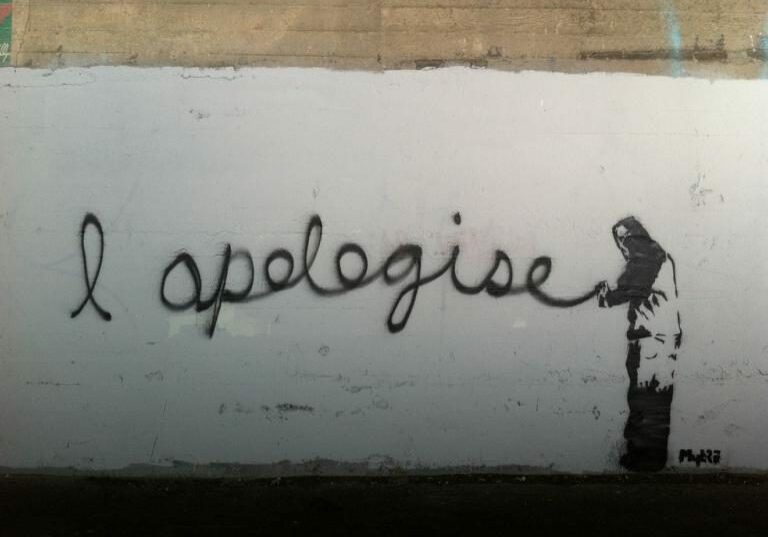♦◊♦
I never understood why the women I loved were so often angry at me.
My intentions were always good, and my heart always in the right place. I certainly never wanted to hurt anyone, least of all the woman I was trying my damndest to love.
Then one day, in the painful midst of yet another lover-spat going nowhere fast, I finally got it:
I am wickedly skilled at dismissing a woman’s hurt feelings as invalid on the grounds of my good intentions. In my certainty that she’s simply misread the situation, I dismiss her reality as invalid, and that would infuriate most anyone … including me!
Here are things I’d typically say when stubbornly refusing to take responsibility for how my actions (or words) negatively impacted my partner:
“Stop focusing on the negative; see the bigger picture (silver lining) instead.”
“You’re a grownup, responsible for your own feelings. Don’t blame your choice (to suffer) on me!”
“If you really understood my (good) intentions you wouldn’t be so upset.”
Yikes.
While those words are well-intentioned, possibly even speak truth, they’re not helpful.
They’re verbal uppercuts thrust towards her when her upset threatens the shame – or the arrogance – lurking within me.
What I later understood a woman was often wanting from me when she feels hurt by something I’ve done or said … is simply comfort and reassurance.
She doesn’t want to be shown the “errors” in her thinking. She wants to feel emotionally connected and safe with me again.
Yet my responses never created connection or safety.
What they did instead is merely confirm for her that I don’t understand her world at all.
I always thought I was doing my partner a great service by helping to rid her of “negative” feelings or thoughts using perspective and logic (my own, to be sure).
I didn’t understand that perspective and logic were only helpful after she felt fully seen and acknowledged by me.
After 7 years of coaching couples (and 30 years personal experience), I’ve found that perhaps the biggest obstacle to conflict resolution is learning to understand that:
(a) My desire (intention) to not hurt my partner is never the determining factor as to whether they’re actually hurt, and
(b) Acknowledging and validating their experience, feelings, hurt does not necessarily mean I must also see things the same way or agree on the root cause (e.g. who/what is at fault).
As we get better at responding to a partner’s upsets with curiosity and deep listening – and stop fighting on the hill of well-intentioned righteousness – relationship gets better.
Disagreements don’t spiral into verbal-emotional combat.
Misunderstandings and miscommunications don’t morph into all-night cage matches.
Instead, moments of disconnect actually get repaired … damn near immediately.
PRACTICE
Next time your partner (or close friend, family member) communicates an upset towards you, before you respond, take a deep breath.
Then take 10 more deep breaths.
I know, chances are, they’re not communicating skillfully.
They may be blaming or accusing you of something you don’t believe yourself guilty of. They may even be attempting to shame you, which is neither kind nor helpful. Harshness never works for love.
** Need better communication skills? Do “The Conflict to Connection” 90-Day Program.
** Need better boundaries, do “The Boundaries Program: Relationships Suck Without Boundaries!”
Nonetheless, consider that it’s likely they have rarely (if ever) felt deeply seen, heard, or validated by the world around them, even by the ones they love most.
So for even just a moment, can you acknowledge their hurt, their upset, their pain?
Even if you don’t agree with their conclusions or reasons for their upset, can you simply acknowledge this is real for them?
“I really get that this is upsetting for you.”
“I can clearly see you’re hurting and want you to know I accept this is real for you.”
Tempting as I know it is, for now leave out the part about disagreeing with them. That only serves to reinforce their sense of disconnect from you.
Stay with them in their pain, even just a few minutes.
If they persist with harshness – blame or shame – or you just find that you just don’t have the patience or capacity to sit with them through this, then consider getting professional support.
When my partner and I run into the walls that protect our own deep wounds and we cannot hear or see each other, we get professional help – and she’s a marriage and family therapist and I’m a relationship coach!
You’re not supposed to figure this out alone.
If you want a thriving relationship, however, you must figure out that your words and actions can still hurt your partner, despite your best intentions, and that validating their experience is not the same as agreeing with it.
Learn this, and intimate relationship will change forever for you … for the massively better.
♦◊♦
- 546shares
- 528Facebook
- 1Twitter
- 6Pinterest
- 11Email




Leave a Comment